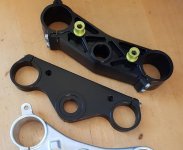danpayneuk
Plastic
- Joined
- Feb 13, 2021
Hey guys
Another question already!!
For you that are machining Aluminium 7075 T6, how do you handle and store your components after machining?
We have been producing some sprockets, but can't stop them oxidising before sending off to get anodised. I am at a complete loss how to stop it happening so quickly. It seems to happen really quickly, usually within a few days or in some instances much quicker.
I have been running the last lot through the tumbler, degreasing them ( wearing gloves during the handling stage out of the tank), drying and wrapping up. I have just checked on a few after noticing one had signs of oxidisation again and noticed it wasn't the only one!!!
Obviously Im doing something wrong or missing a step somewhere.
Any help would be greatly appreciated.
Thanks
Dan
Another question already!!
For you that are machining Aluminium 7075 T6, how do you handle and store your components after machining?
We have been producing some sprockets, but can't stop them oxidising before sending off to get anodised. I am at a complete loss how to stop it happening so quickly. It seems to happen really quickly, usually within a few days or in some instances much quicker.
I have been running the last lot through the tumbler, degreasing them ( wearing gloves during the handling stage out of the tank), drying and wrapping up. I have just checked on a few after noticing one had signs of oxidisation again and noticed it wasn't the only one!!!
Obviously Im doing something wrong or missing a step somewhere.
Any help would be greatly appreciated.
Thanks
Dan




